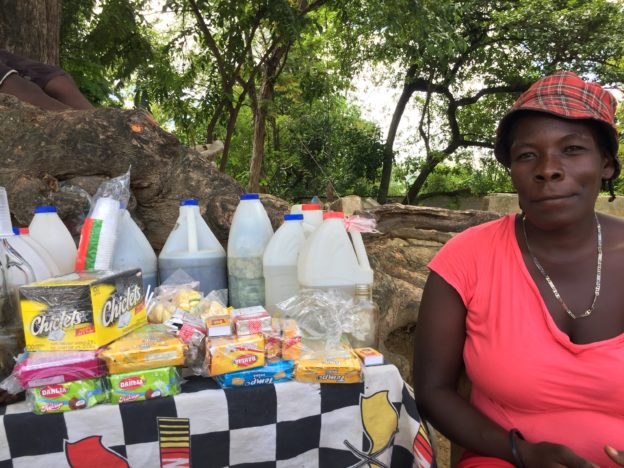I’ve written about Christella before. (Here.) She lives in Labasti, across from the space that becomes the largest market in southern Mibalè every Thursday. On market day, the space along the side of the road, in front of where she sits with her business, fills with dozens of motorcycle taxis, the drivers waiting to take on passengers as they leave the busy market to return downtown, or wherever they need to go. The livestock market across the street has been growing steadily over the last years. Strong demand for meat in Pòtoprens sends buyers who by dozens of animals – goats, pigs, cows, and horses – to truck them into the capital for butchering and distribution.
When I first met her, Christella was living in a rented room with two children a short distance north of the same market. The children’s father was starting to pull away from her and his kids, spending more and more time in Pòtoprens and providing less and less support. She wasn’t sure how she would pay the rent when it came due. She had been keeping herself and her children fed by selling fresh vegetables in the market, but she had been doing it with money borrowed from a neighbor, and one week of disastrous sales left her unable to repay what she owed. Soon after that the business collapsed entirely.
But her 18 months in CLM were productive. She made great progress, much of it connected with a change in her personal life. She met another man, Michelet. Eventually, they moved in together. We know that progress is much easier for women with reliable partners. That isn’t surprising. Michelet was struggling at the time, just as Christella was. He was a construction worker, but he had broken his leg badly in a motorcycle accident, and the leg had been mis-set, leaving him with a bad limp. Without a crutch, all he could do was hop on one foot.
But he was willing to work hard. He brought in small bits of farming income and helped her with the various kinds of work that success in CLM requires: managing livestock, assembling construction materials for home repair and latrine construction, etc. He began earning extra income by working at a roadside tire-repair shop. It was reliable money, but very little. None of the equipment was his, so he owed the owner half of everything he made.
When he and Christella saw how much money tire repair could bring in, they came to their case manager with a plan. They would sell out their livestock, which had begun to multiply, and buy a full set of tire repair equipment for Michelet, including a used gas-powered air compressor. The case manager agreed that the investment made sense, so the couple went ahead. Christella graduated in December 2014, easily meeting all the criteria.
But that time, Christella had gone back into the vegetable business as well, but it was a very up-and-down endeavor. Selling perishables was always risky. Every once in a while, she’d take a loss, and they’d have to replenish her capital from Michelet’s tire-repair income. But it wasn’t a problem, because he was making enough. They even started replacing the livestock they had sold off to buy his compressor.
When the first compressor broke down, they were able to replace it with another. When the second one broke down, they chose not to. They initially used the money they got from selling it to buy more livestock, but eventually they turned around that livestock by selling it to buy a used motorcycle. They paid 22,500 gourds, or about $350. Michelet would start driving a taxi. Christella gave him money out of her business to repair the motorcycle, and he took additional money out of a field of sugarcane they had planted together.
That’s when things changed for the worse for Christella. “The motorcycle is what broke up my family.” Michelet started getting around more, and he found a girlfriend. Soon he had left Christella. They have two children together, in addition to the two she had when they first met, and Michelet hasn’t been supporting them at all. She now depends entirely on her small business to support herself and all four kids.
But she’s no longer selling vegetables. She sets up her table next to the road near her house every day and sells cookies, crackers, lollipops, and chewing gum. “I sell a little bit throughout the day to kids who come by and want a snack.”
Those snacks, however, are not her main business. Her main business is cigarettes, snuff, and kleren, the local rum that is popular throughout Haiti. She sells the clear rum, but also knows how to flavor it. Her table usually holds a dozen bottles or more of different rum-based concoctions, flavored with various herbs, spices, or fruits. Cinnamon, passion fruit, and ginger are popular. She buys the raw rum by the barrel for 17,500 gourds. She has wholesale clients, mostly women who have businesses like hers and buy a gallon or two at a time, in addition to her consistent retail trade.
She’s not happy about the situation. She’s understandably angry at having been abandoned by Michelet, enough to have carefully tracked all the money that he took out her businesses to help himself. But she’s confident of her ability to do what she needs to do for her children, with or without his help. She’s ready to send them to school in September, and she plans begin buying more livestock. “This business can take care of me and my children.”
